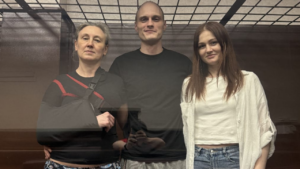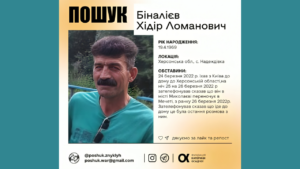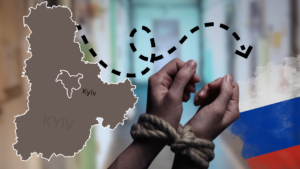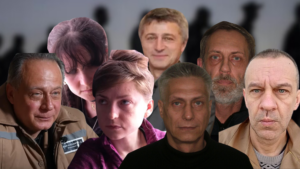Agreements on civilians do not work. Ombudsman’s representative met with relatives of Ukrainian hostages
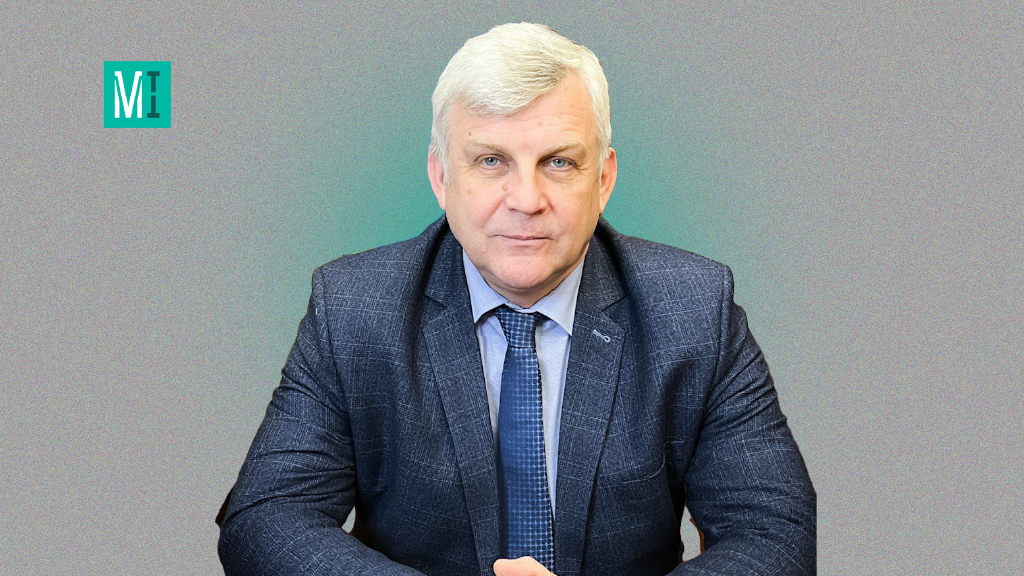
Kyrylo Budanov, Chief of the Defence Intelligence of Ukraine (GUR), says that almost 40% of those in Russian captivity are civilians. MIHR has counted more than 900 civilians abducted by Russians. They are held in prisons of the Russian Federation and the occupied territories of Ukraine. However, the exact number is much higher.
The release of civilian hostages is one of the priorities of the Ukrainian Parliament Commissioner for Human Rights. Therefore, the relatives of the abducted first seek to communicate with his representatives. This is how they learn about the prospects for the release of their loved ones. On March 24, the Ukrainian Ombudsman’s representative, Oleksandr Kononenko, responsible for respecting human rights in state security and defense, met with a group of relatives of civilian hostages from Kyiv Oblast at the Coordination Headquarters for the Treatment of Prisoners of War. However, the Ombudsman’s office does not have optimistic news about the fate of civilians held by Russia.
“Russia considers our civilians as criminals”
Relatives asked about agreements with Russia on returning hostages home. Oleksandr Kononenko answered that any agreements had not been implemented. “The only progress in the issue of civilians is agreements on children. But, I think, it was influenced to a greater extent by the warrants issued against Putin and Lvova-Belova. What is being done? We continue to communicate with them and await an answer to the issues we put before them. The agreement in Ankara did not apply to all civilians. It primarily applies to those people who are the most compromising. These are 12 people older than 65 with a severe health condition and more than 1,900 missing persons aged 70 years. But actual results have not been achieved in these categories. In other words, there are no released persons.”
According to Kononenko, diligent work is underway to collect and record information on Russian war crimes in Ukraine in cooperation with the International Criminal Court.
“International support is being provided. Evidence of this is the International Criminal Court’s steps regarding deported children. All the documents and testimonies related to war crimes are now being collected. All of them will be submitted to the court. There is hope that charges will be brought against those responsible for the issue of civilian hostages,” says Oleksandr Kononenko. He adds that, according to the Fourth Geneva Convention, the Russian Federation must release civilian hostages unconditionally.

Ukrainian Ombudsman’s representative Oleksandr Kononenko
“This convention clearly states that civilian hostages should not be detained. They should be released. What is Russia doing? It “makes all these people criminals” and accuses them of terrorism, opposition to a special military operation, and assistance to the Ukrainian Armed Forces, which is completely absurd from the point of view of an independent state and those people who are patriots of their state,” says Kononenko.
He emphasizes that all of Russia’s crimes became known after the liberation of Ukrainian territories. The facts about the torture camps were documented, and the materials were transferred to the Prosecutor General’s Office, where a separate department dealing with war crimes was created. In addition, data on Russian war crimes are also transferred to the International Criminal Court.
“Civilians have the status of missing persons because the ICRC has not confirmed them”
At the meeting with the representative of the Commissioner, it was reported that work is underway to create a separate group of persons with the participation of representatives of various departments, which will deal exclusively with the issue of civilian hostages and children deported to Russia.
“I will lead this group. I hope that we will be able to achieve the same efficiency in the issue of civilian hostages that the Coordination Headquarters has shown in the issue of prisoners of war,” Oleksandr Kononenko notes.

In Kyiv Oblast, Russians shot houses and abducted civilians, many of which they now hold in Russia’s territory
The meeting also raised the issue of the status of civilians, whom the National Information Bureau often describes as “missing.” According to Kononenko, the status can be changed only after the ICRC confirms that a particular person is a hostage.
“No one verifies them. A civilian is the least protected person compared to military personnel and children. The first step to having a constructive conversation with that party is to confirm the person’s location: find them and find out where they are sitting. Today, on behalf of the Commissioner, we will interview all those released from captivity — firstly, we will ask them about the violation of rights and freedoms; secondly, about whom they were, who they saw, and who they heard about. There is not a lot of information about civilians. Still, it is being received little by little,” Oleksandr Kononenko notes, stressing that the only legal confirmation, verification of the hostage, is information from the ICRC. — Everything else is unofficial confirmation. It is good that, at least at the initial stage, the ICRC approved a small number of people, particularly from the Kyiv region.”
People’s deputy Olha Vasylevska-Smaglyuk, who was present at the meeting, asked the Commissioner’s representative to inform whether it is possible to improve communication between the Commissioner, the Coordination Headquarters, the National Information Bureau (NIB), and the hostages’ relatives, whether the relatives will be able to receive information directly from state structures about the Security Service’s surveys of those released from captivity, which inform about the condition and the place of detention of civilian hostages. “Please appoint someone who will work and inform people about the evidence. NIB representatives may be able to provide people with whether there is information about their relatives. Organize a meeting so that relatives can learn about the information available in the bureau about their relatives,” urges Vasylevska-Smaglyuk.

Demydiv village in Kyiv Oblast was heavily damaged during the occupation in March of 2022
During the meeting, the GUR representative confirmed that after released persons testify about who they saw in prison, such information is not given to the hostages’ relatives as this is not provided in the regulations.
“We work within the framework defined by the law. We survey those who returned from captivity; the working group of the Coordination Headquarters does this. The information is transmitted to the Armed Forces of Ukraine, the National Guard of Ukraine, the National Police, and so on, including NIB. We cannot share this information. Even when we conduct a survey, we do not inform the relatives; we pass the information to the NIB, which, based on the information received, changes the account from “missing” to “allegedly held hostage.” There is a criminal proceeding, and at your request, the investigator can make inquiries and get information about who and what testified about the missing person. When the guys (released from captivity, MIHR) testify to something, the Headquarters always helps them to inform the relatives of these persons,” says the representative of the GUR.
“Nothing new. You have to wait again. Maybe until the end of the war?”
After meeting with the representative of the Commissioner, the relatives of the civilian hostages abducted by Russians in February-March 2022 in the territory of the Vyshgorod district told MIPL that they heard the same thing that the representatives of the Coordination Headquarters and the Ombudsman’s office had already voiced.
“Unfortunately, we did not learn anything new. The only thing is that they explained that there would probably be no release of civilians until the country is freed from evil. At least I want to know where he is, and the rest… We’ll wait. I plan to go to a meeting with representatives of the NIB. Maybe they will say something there. We have six people in the Dymerska Gromada (Community) about whom nothing is known. My son is on this list,” says Lidia Lyakh, the mother of the missing Yuriy Lyakh, whose disappearance story was recently published by MIHR.

Mother of missing Yuriy Lyakh hopes to find at least some information about her son
Yana Sheremet, whose father was abducted by the occupiers in Dymer, Kyiv Oblast, at the end of February 2022 (MIHR reported about him), says about the need to create a special mechanism that would allow civilian hostages to be returned to Ukraine.
“During the year the Coordination Headquarters and other services have been working, I did not see any changes, just as I did not see any changes about my father. The fact that they are now relying on the Geneva Convention – “they must release the hostages” — sorry, no one will release them just like that. This requires action. An effective mechanism is needed — exchanges or sanctions — because a year has passed, and only a few civilians were released through exchanges. It is insulting that family members are not informed about their loved ones. It would be important for relatives to find out about their loved ones; we would feel much calmer,” says Yana Sheremet.

Yana Sheremet’s father, Serhiy Khrolenko, is probably in one of the Russian prisons
Maria Kovaliova, the sister of Anatoliy Vaskivskyi, who was kidnapped in Kyiv Oblast, says that the first wish of all hostages’ relatives is to return home their loved ones, whom the Russian Federation holds in detention places. “I understand that children are more important than adults, but I would like the civilian hostages to return. But at meetings with the representative of the Commissioner, we are told the same thing all the time – nothing new. It is hard to believe that Russia will start releasing civilian hostages without any conditions. I ask various people about the prospects of their return, and many are inclined to think that it will only happen after a victory. There are rumors about future exchanges with the participation of civilians, but whether such exchanges will take place is unknown,” says Maria Kovaliova.


